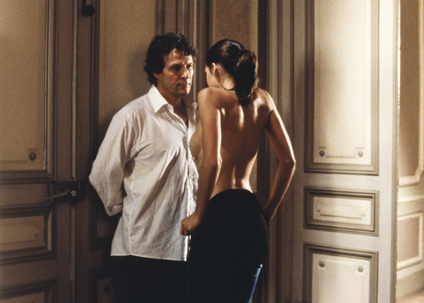|
Reviews of Recent Independent, Foreign, & Documentary Films in Theaters and DVD/Home Video
Directed & Written by: Jean-Claude Brisseau. Produced by: Brisseau, Miléna Poylo & Gilles Sacuto. Director of Photography: Wilfrid Sempé. Edited by: Maria Luisa Garcia. Released by: IFC First Take. Language: French with English subtitles. Country of Origin: France. 104 min. Not Rated. With: Frédéric Van Den Driessche, Maroussia Dubreuil, Lise Bellynck & Marie Allan. Director Jean-Claude Brisseau’s previous film, Secret Things, a torrid melodrama blending sexual brinkmanship with unbridled capitalism, opens with a woman masturbating on stage in font of a blasé audience, setting its provocative tone. After that film was made, Brisseau was charged with harassing and defrauding two actresses who had auditioned for the film but weren’t cast. (He received a fine, a one-year prison sentence was deferred, and charges were dismissed.) Less a warning than a self-flagellation, his new film, Exterminating Angels, explains how a man in his position could be falsely accused and persecuted. His fictional counterpart is both auteur and victim in this not quite persuasive mea culpa. Brisseau begins his case with a dream sequence, where the ghost of François’s grandmother warns her grandson not to let his curiosity overtake him. Two black-clad fallen angels also loom over the director as he sleeps, conspiring, and setting the plot in motion, wandering sight unseen during François’ unraveling. The goal of François’ next film is to capture sexual transgression in women. Strangely, there isn’t a casting director or producer assisting François in the selection process. After many bolt, two show promise. Before offering anyone a role, François directs Charlotte (Maroussia Dubreuil) in an improvisation at a restaurant, gently ordering her to remove her panties, pleasure herself while ignoring the surrounding diners, and then to direct her attention to late-arrival Julie (Lise Bellynck). The trio leaves the white-linen restaurant, shockingly without touching their food or champagne, to a nearby hotel for further exploration. According to François, the experiment will be used for his script. Yet he doesn’t bring a camera, but he does keep his hands in clear view, always remaining a passive observer. Among the many warning signs that he’s heading towards trouble, Charlotte trashes her apartment, and calls François at all hours, pleading to see him. Even François’ wife warns him of Charlotte’s obvious raging ego, describing it “as big as a cathedral.” Further, the casting of the handsomely rugged Frédéric Van Den Driessche as François undermines Brisseau's defense. With his wavy locks and unbuttoned shirt, he’s like an aloof and older Warren Beatty, circa Shampoo. If he wore cologne, it would be Brut. Incredulously, the perplexed François fails to realize the effect of his charms or how his actresses may look up to him as a father figure they want to please (he is calling the shots, after all), never acknowledging the possibility of an on-set attraction between himself and a vulnerable, considerably younger, and often nude actress. Catherine Breillat, another French provocateur, believes an actors’ job is to be manipulated by a director – bluntly stated and largely true. But it is also a helmer’s responsibility to discern who can be selfless and malleable.
What diverts François’ focus: the intense sex scenes before him. It’s not the actresses who may feel like they’re misbehaving, but the film’s
audience, slightly discomfited by the power of the women’s concentration while spying on extremely private moments. These are by far the most
convincing scenes. But in this age of easy access amateur porn and 30 years after Nancy Friday’s erotica, whether
self-pleasure or a female ménage à trois is transgressive is debatable. But in the end, it doesn’t matter. As in Secret Things, it’s about
the sex, stupid.
Kent Turner
|

